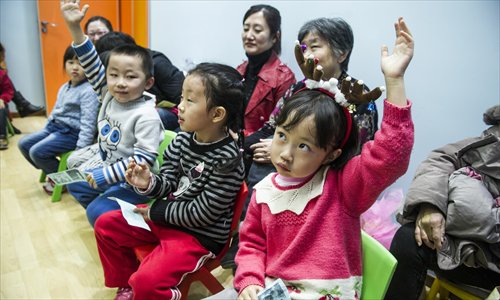

A young girl gets into the Christmas spirit by wearing reindeer antlers during a class on December 24 at an English training center in Maliandao, Xicheng district. Photo: Li Hao/GT
Revising teaching methods
Xu, an education graduate of the University of Florida, said China has yet to develop a "localized way for children to learn English" that differs from universal teaching methods.
Xu believes commercial English schools in China will follow the lead taken by Japan and South Korea by increasing their proportion of teachers who are native English speakers.
"There aren't enough native English-speaking teachers who are able to stay in China for a long period to develop a systematic, localized English teaching methodology," he said. "But as the yuan's value straightens, more foreign English teachers will come to China to settle down and pursue long-term career goals. Improving the standard of teachers will lift the quality of English teaching."
In November, the Beijing Municipal Commission of Education banned students below 12 from taking part in the Graded Examination in Spoken English (GESE), which used to be favored by many elite middle schools in choosing candidates.
Xu said Nice Education World would continue basing some of its teachings around the GESE syllabus because "many dialogues of the oral test are set in a Chinese context identifiable in daily life."
Pressure to excel in tests
Education authorities' purpose of reducing English at schools is to allow parents to decide what is best for their children, according to Xu.
"In the past, schools decided when and what students should learn. Now, parents should make their decision and assess the importance of English among other curriculum subjects," he said.
Among parents at Nice World Education's Maliandao center on Tuesday was a woman surnamed Wang, who attentively watched her 7-year-old daughter play games with classmates during their lesson. Wang said her daughter has attended weekly classes at the center since she was 4.
Wang said the government's education reforms wouldn't diminish the importance she and other parents attach to their children's English studies. "Most children of my colleagues and friends attend after-school English classes. Some of my colleagues even have children who attend daily English classes," she said.
Learning English at private schools is necessary because children's ability to learn is best tested outside of regular school, Wang said when asked of the importance of attaining certification of tests they offer.
Wang plans to send her daughter to math Olympiad classes and other after-school courses once she reaches middle school. "Chinese students have a really tiring childhood," Wang sighed. "But then again, Chinese parenthood is also tiring."
Mengmeng (pseudonym), an 11-year-old grade-six student at the Elementary School Affiliated to Renmin University of China, one of Beijing's most exclusive primary schools, had never attended a private school up until recently because his parents believed it to be unnecessary.
Mengmeng's mother, surnamed Jing, looked into several private schools at Haidian district some years ago before deciding none were worth it.
But faced with pressure to perform well in English tests to get into a good middle school, Mengmeng recently began one-to-one classes with a private tutor.
"Getting a good score is important because it will influence his confidence in learning English," Jing said.
Although the English curriculum has come under threat from education authorities, teachers at public schools beyond Beijing remain committed to their courses. "Our daily teaching schedules haven't changed," said Zhou Yuzhuang, a high school English teacher in Chongqing.
"The purpose of reforms is to reduce students' burden in learning English and their gaokao pressure. It is also good for teachers, who shoulder pressure in helping students get the best possible test scores. China has become used to training students to excel in exams, regardless of whether it is the gaokao, TOEFL or IELTS."
Cutting English classes to boost cram schools
2013-11-22Mixed reactions over cutting English classes
2013-11-21Copyright ©1999-2018
Chinanews.com. All rights reserved.
Reproduction in whole or in part without permission is prohibited.